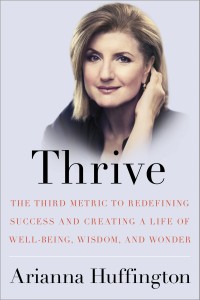 If you awoke one morning in a pool of blood, you’d probably change your life.
If you awoke one morning in a pool of blood, you’d probably change your life.
That’s what happened to Arianna Huffington of Huffington Post fame after collapsing from exhaustion and smashing her cheekbone on a table as she dropped to the floor.
She was at the peak of her success, with money and power in abundance:
But I was not living a successful life by any sane definition of success. I knew something had to radically change. I could not go on that way.
Thrive is Huffington’s account of how she redefined success and turned her back on the workaholic lifestyle that had almost killed her. Using the illustration of a stool, she diagnosed what had happened to her:
Over the long term, money and power by themselves are like a two-legged stool—you can balance on them for a while, but eventually you’re going to topple over. And more and more people—very successful people—are toppling over.
She then goes on to prescribe a third leg for a stable stool, or a third metric as she puts it:
To live the lives we truly want and deserve, and not just the lives we settle for, we need a Third Metric, a third measure of success that goes beyond the two metrics of money and power, and consists of four pillars: well-being, wisdom, wonder, and giving.
- Well-being is physical, mental, emotional, and relational health.
- Wisdom seems a bit nebulous, but it’s some kind of inner wisdom that we can access by “centering ourselves.”
- Wonder is our sense of delight in the mysteries of the universe, as well as the everyday occurrences and small miracles that fill our lives.
- Willingness to give is generosity or charitable giving and serving.
Thrive is built around these four pillars with most space given to Well-being.
So, is this a book worth buying? I would say so, and here’s why:
1. You’ll find out a lot about one of the most talented and influential women in our culture. Huffington weaves her own story throughout, narrating both her successes, and her sadnesses, including her divorce and her daughter’s drug addiction.
2. You’ll learn lots of useful facts, research, and data about how to thrive. Huffington’s popular presentation of scientific research into human flourishing was the highlight of the book for me. Unlike Gretchen Rubin’s Happiness Project which didn’t have one footnote or reference for any of the myriad facts she cited, Huffington’s claims are well documented with over forty pages of endnotes.
3. You’ll be persuaded by her diagnosis. It’s painfully convicting, but Huffington will convincingly demonstrate many connections between the way we are living and the lack of life we are experiencing.
4. You’ll be able to use some of her prescriptions. There’s a lot of common grace in this book, many insights into human nature, and lots of good advice about how to flourish as human beings. Yes, there’s quite a bit of nonsense too, but it’s relatively easy to separate the wheat from the chaff.
5. You’ll have a renewed appreciation for Christianity’s sufficiency and suitability. I found myself feeling sorry for Huffington as she combed world religions and philosophies for anything that she felt might help people. A bit of Bible, a bit of Yoga, a bit of Hinduism, a bit of Hollywood, a bit of this, a bit of that, and a bit of everything really. She is one confused lady when it comes to religion, I’m afraid. What a blessing to have a clear, consistent, and comprehensive Christian worldview.
6. You’ll understand our culture better, not just the pressures people are facing but also what ideologies and practices they are resorting to as they seek help to survive or even thrive in this stressed-out world.
7. You’ll realize how important it is to get your smartphone under control. Huffington comes back to this time and time again throughout the book. But given the evidence she marshals for the damage our devices are doing to us, the emphasis is definitely warranted.
8. You’ll get motivated to meditate by its multiple benefits. You won’t want to follow Huffington’s techniques for meditating, but the scientifically proven benefits she presents are a strong persuasive to biblical meditation.
9. You’ll learn how important sleep is. Lack of it almost killed Huffington, and having survived she’s now a sleep evangelist, who’s added me to her list of converts.
10. You’ll think more about death. What? Yes, Huffington wants us to think more about death! Let me finish with a quite astonishing section.
In fact, there may be no single thing that can teach us more about life than death. If we want to redefine what it means to live a successful life, we need to integrate into our daily lives the certainty of our death. Without “dead” there is no “alive.” Death is the sine qua non of life. As soon as we’re born, we’re also dying. The fact that our time is limited is what makes it so precious.
I vividly recall all the preparations I went through during my pregnancies: the Lamaze classes, the breathing exercises, the endless reading on the subject. How strange, I thought to myself one day, to spend hour upon hour learning how to bring life into the world, but hardly a minute learning how to leave it. Where are our culture’s preparations for leaving life with gratitude and grace? (p. 204)
Doesn’t that pique your interest even a little?